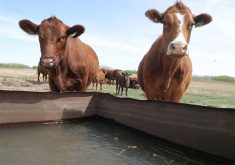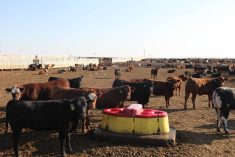Consumers are showing no signs of eating less meat and cheese but are increasingly concerned with how animals are treated before they become dinner.
There is a need for a consistent set of ethical guidelines common to all livestock, said Ray Stricklin, associate professor at the University of Maryland, speaking to the Farm Animal Council of Saskatchewan’s annual conference in Saskatoon Dec. 13.
“The public wants assurances that animals have experienced a reasonable quality of life,” he said.
Stricklin said they want to see animals used for research and food treated in appropriate ways.
Read Also

Alberta eases water access for riparian restoration
Alberta government removes requirement for temporary diversion licence to water plants up to 100 cubic metres per day for smaller riparian restoration projects
They also want to maintain good access to products from animal agriculture, he said, citing animal protein consumption rates have remained largely the same for 50 years.
Some consumers are willing to pay for those animal welfare assurances, so there remains a place for niche and smaller scale operations offering free-range animals.
Stricklin said many farming practices today are not well understood by an urban population more familiar with canines than bovines. That has provided fertile ground for the rise of the animal rights movement.
Stricklin thinks there is a middle ground for farmers in the debate.
“We need to find a place on the shoulder with reasonable production costs and increased welfare.”
New European Union rural policy will pay farmers for following good farming practices, said Ed Pajor of Purdue University.
Europeans are moving toward developing assessment standards for animal welfare, where farmers would be audited, accredited and certified for their efforts in providing basics like adequate housing, feed and freedom of movement.
Pajor said understanding consumer attitudes toward farm treatment of food animals is a key component to sustainable farming.
“If you adopt guidelines reflecting what people want to see, the acceptance of animal agriculture is going to be greater and criticisms more easily dismissed,” he said.
He cited the cases of Smithfield Foods, McDonald’s, Burger King and Maple Leaf announcing their intention to move away from buying animals confined in stalls for long periods.
Pajor said animal care could become a trade issue in future.
“Animal welfare is not going away; it’s an issue that’s going to become a part of how business is done.”
Pajor advised producers to listen to the debate and not fear it, calling it a chance for all in the industry to have input and increase understanding of the business of raising livestock.
“It’s a way to connect back with the population and convince them of the good things producers are doing,” he said.
Dan Davidson of Maple Leaf Consumer Foods supports improvements to animal welfare measures.
Maple Leaf does regular audits and has consulted with animal behaviour specialists in designing its plants. The Brandon plant hopes all truckers delivering pigs there will have Trucker Quality Assurance safe handling certificates in future.
Davidson encouraged producers supplying Maple Leaf to adopt the Canadian Pork Council’s animal care assessment tool.
















